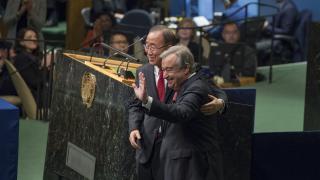
KATY:
Neither direct nor representative democracy is predicated on the notion that the people are always correct. The will of the people is channelled through systems that promote civil discourse, enlightened institutions, and consensus. Voters in representative democracy have multiple opportunities to be wrong and to reconsider decisions. Direct democracy has higher stakes. Voters may not have the chance to reconsider past miscalculation.
Direct democracy can be structured to promote discourse and consensus, and to improve democratic institutions, lowering the stakes. How a referendum is organised impacts whether its outcomes reinforce democracy and informed consensus.
Three recent referendums, on peace in Colombia, European immigration policies in Hungary, and Brexit, have led some to argue that sovereignty referendums are divisive and should not be used. Critics argue that incompetent voters with imperfect information make poor decisions.
Instead of assuming that voters are unable to make informed, enlightened decisions, it is more useful to look at how these referendums were carried out. Did the structure, for example, of each referendum allow voters to make good choices at the polls?
Voters need good, non-partisan, easy-to-access information. None of the referendums in the UK, Colombia, or Hungary had sufficient public information campaigns. The vote in the UK had the most lead time with the highest level of public discussion. Yet, the campaign has been criticised for failing to provide voters with the most basic information on what was at stake and potential consequences. In Colombia, the timeframe between the finalisation of the peace accord and the vote on its ratification was a month, and the 297-page agreement was poorly understood in much of the country. In Hungary, the “no” campaign was dominated by inflammatory language, and the vote was boycotted by the opposition.
On the other hand, in each country there are measures in place that check the impact of direct democracy. In the UK, the vote to exit the EU cannot trigger a divorce in and of itself. As the recent high court ruling demonstrates, other institutions will have input into the interpretation and implementation of the Brexit vote. In Hungary, the turnout threshold led to the defeat of the measure. In Colombia, the consultative nature of the vote left the government able to return to peace talks. There may yet be a vote approving a peace deal there.
So should a government organise a referendum if the stakes are so high and the outcome is unpredictable? The votes in the UK and Hungary were self-inflicted wounds. These could have been avoided, and governments could have improved their conduct. The Colombia vote added value to the process despite the negative vote. Peacemakers there have more work to do.
ROSLYN:
No one is always right. In fact, the very concept of ‘right’ itself will always be subject to dispute. But while the people may not always be ‘right’, their will should always be regarded as legitimate.
If one believes that all human beings are political equals, then one must allow the will of the majority to prevail. Only if one believes that some are more equal than others, may one contemplate some form of minority rule in which the will of the people is filtered out, ignored or otherwise overturned.
It has become the fashion to favour majority rule as long as it delivers the ‘right’ answers, while keeping a back door open in case it doesn’t. This view has been fuelled by recent referenda, such as Brexit in the UK, the rejection of a peace deal between the Colombian government and FARC, and the alleged Hungarian rejection of EU migrant quotas (the referendum was actually boycotted into invalidity). Many favour ignoring these outcomes as they are said to have occurred in ‘post-truth societies’, where politicians simply make things up to suit their agenda.
This view assumes that the decision-making formula is perfect; only the results are wanting. Nothing could be further from the truth.
Leaving aside the point that in unequal societies, the truth is not so much dead as subject to genuine divergences based on lived experience, referendum debates are often closely controlled by politicians, media and industry leaders. Moreover, they are held at such widely spaced intervals as to be virtually meaningless vis-a-vis the concrete question proposed, but at such a pinpoint in time as to make them vulnerable to outside circumstances. In Colombia, for instance, turnout was affected by extreme weather that disproportionately struck pro-peace deal regions. The will of ‘the people’ that may be expressed under these circumstances is, at the very least, highly distorted. But to conclude that it should therefore be illegitimate is to engage in a kind of advance capitulation to tyranny.
If someone finds a loophole in a law, we do not simply give up on regulating. We go back to the drafting table and close the loophole.
And so it is with democracy: the only way forward for those who value the rule of law and human rights is not to repress political equality, but to embrace it. It is perfectly feasible to make the public will less liable to malevolent distortion –this is increasingly possible with technology and has been proven again and again in participatory budgeting and consultation experiments around the world.
After all, every dictator is also happy to accept the will of the people when it suits them.



















